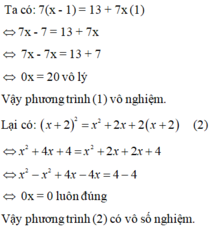(x2-7).(x+2)-(2x-1).(x-14)+x.(x2-2x-22)+35

Những câu hỏi liên quan
Giải phương trình :
1) √x2+x+2 + 1/x= 13-7x/2
2) x2 + 3x = √1-x + 1/4
3) ( x+3)√48-x2-8x= 28-x/ x+3
4) √-x2-2x +48= 28-x/x+3
5) 3x2 + 2(x-1)√2x2-3x +1= 5x + 2
6) 4x2 +(8x - 4)√x -1 = 3x+2√2x2 +5x-3
7) x3/ √16-x2 + x2 -16 = 0
Giải các phương trình sau:
g/ x(x + 3)(x – 3) – (x + 2)(x2 – 2x + 4) = 0
h/ (3x – 1)(x2 + 2) = (3x – 1)(7x – 10)
i/ (x + 2)(3 – 4x) = x2 + 4x + 4
k/ x(2x – 7) – 4x + 14 = 0
m/ x2 + 6x – 16 = 0
n/ 2x2 + 5x – 3 = 0
\(m,x^2+6x-16=0\)
\(\Leftrightarrow x^2-2x+8x-16=0\)
\(\Leftrightarrow x\left(x-2\right)+8\left(x-2\right)=0\)
\(\Leftrightarrow\left(x+8\right)\left(x-2\right)=0\)
\(\Leftrightarrow\left[{}\begin{matrix}x+8=0\\x-2=0\end{matrix}\right.\)
\(\Leftrightarrow\left[{}\begin{matrix}x=-8\\x=2\end{matrix}\right.\)
\(n,2x^2+5x-3=0\)
\(\Leftrightarrow2x^2-x+6x-3=0\)
\(\Leftrightarrow x\left(2x-1\right)+3\left(2x-1\right)=0\)
\(\Leftrightarrow\left(x+3\right)\left(2x-1\right)=0\)
\(\Leftrightarrow\left[{}\begin{matrix}x+3=0\\2x-1=0\end{matrix}\right.\)
\(\Leftrightarrow\left[{}\begin{matrix}x=-3\\x=\dfrac{1}{2}\end{matrix}\right.\)
Đúng 2
Bình luận (0)
\(k,x\left(2x-7\right)-4x+14=0\)
\(\Leftrightarrow2x^2-4x-7x+14=0\)
\(\Leftrightarrow2x\left(x-2\right)-7\left(x-2\right)=0\)
\(\Leftrightarrow\left(2x-7\right)\left(x-2\right)=0\)
\(\Leftrightarrow\left[{}\begin{matrix}2x-7=0\\x-2=0\end{matrix}\right.\)
\(\Leftrightarrow\left[{}\begin{matrix}x=\dfrac{7}{2}\\x=2\end{matrix}\right.\)
Đúng 2
Bình luận (1)
Xem thêm câu trả lời
a)(2-x)(1 2x) (1 x) - (x^4 x^3-5x^2-5)
b) (x^2-7) (x+2) - (2x-1)(x-14)+ x(x^2-2x-22) + 35
b) Ta có: \(\left(x^2-7\right)\left(x+2\right)-\left(2x-1\right)\left(x-14\right)+x\left(x^2-2x-22\right)+35\)
\(=x^3+2x^2-7x-14-\left(2x^2-28x-x+14\right)+x^3-2x^2-22x+35\)
\(=2x^3-29x+21-2x^2+29x-14\)
\(=2x^3-2x^2+7\)
Đúng 2
Bình luận (3)
1.Tìm GTNN của Bthức : B= 4x2- 6x+1 : (x-2)2 với x ≠ 2
2. Tìm GTLN của Bthức: C= x2 + 4x - 14 : x2 -2x +1 với x≠ 1
giúp mình với ạ, mình cảm ơn nhiều ạ
1.
Đặt \(x-2=t\ne0\Rightarrow x=t+2\)
\(B=\dfrac{4\left(t+2\right)^2-6\left(t+2\right)+1}{t^2}=\dfrac{4t^2+10t+5}{t^2}=\dfrac{5}{t^2}+\dfrac{2}{t}+4=5\left(\dfrac{1}{t}+\dfrac{1}{5}\right)^2+\dfrac{19}{5}\ge\dfrac{19}{5}\)
\(B_{min}=\dfrac{19}{5}\) khi \(t=-5\) hay \(x=-3\)
2.
Đặt \(x-1=t\ne0\Rightarrow x=t+1\)
\(C=\dfrac{\left(t+1\right)^2+4\left(t+1\right)-14}{t^2}=\dfrac{t^2+6t-9}{t^2}=-\dfrac{9}{t^2}+\dfrac{6}{t}+1=-\left(\dfrac{3}{t}-1\right)^2+2\le2\)
\(C_{max}=2\) khi \(t=3\) hay \(x=4\)
Đúng 0
Bình luận (0)
a, 3x2 -14|x|-5=0
b,|x-1| + x2= x + 3
c,|x+2|-2x+1=x2+2x+3
a: Đặt |x|=a
Pt trở thành \(3a^2-14a-5=0\)
=>(a-5)(3a+1)=0
=>a=5(nhận) hoặc a=-1/3(loại)
=>x=-5 hoặc x=5
c: \(\left|x+2\right|-2x+1=x^2+2x+3\)
\(\Leftrightarrow\left|x+2\right|=x^2+4x+2\)
\(\Leftrightarrow\left\{{}\begin{matrix}x^2+4x+2>=0\\\left(x^2+4x+2-x-2\right)\left(x^2+4x+2+x+2\right)=0\end{matrix}\right.\)
\(\Leftrightarrow\left(x^2+3x\right)\left(x^2+5x+4\right)=0\)
hay \(x\in\left\{0;-3;-1;-4\right\}\)
Đúng 2
Bình luận (1)
1) (1-x)(5x+3)=(3x-7)(x-1)
2) (x-2)(x+1)=x2-4
3) 2x3+3x2-32x=48
4) x2+2x-15=0
5) 2x(2x-3)=(3-2x)(2-5x)
6) x3-5x2+6x=0
7) (x2-5)(x+3)=0
8) (x+7)(3x-1)=49-x2
\(\left(1-x\right)\left(5x+3\right)=\left(3x-7\right)\left(x-1\right)\)
\(< =>\left(1-x\right)\left(5x+3+3x-7\right)=0\)
\(< =>\left(1-x\right)\left(8x-4\right)=0\)
\(< =>\orbr{\begin{cases}1-x=0\\8x-4=0\end{cases}< =>\orbr{\begin{cases}x=1\\x=\frac{1}{2}\end{cases}}}\)
\(\left(x-2\right)\left(x+1\right)=x^2-4\)
\(< =>\left(x-2\right)\left(x+1\right)=\left(x-2\right)\left(x+2\right)\)
\(< =>\left(x-2\right)\left(x+1-x-2\right)=0\)
\(< =>-1\left(x-2\right)=0\)
\(< =>2-x=0< =>x=2\)
\(2x^3+3x^2-32x=48\)
\(< =>x^2\left(2x+3\right)-16\left(2x+3\right)=0\)
\(< =>\left(x^2-16\right)\left(2x+3\right)=0\)
\(< =>\left(x-4\right)\left(x+4\right)\left(2x+3\right)=0\)
\(< =>\hept{\begin{cases}x=4\\x=-4\\x=-\frac{3}{2}\end{cases}}\)
Xem thêm câu trả lời
rút gọn biểu thức
1/(2x+3)2-2(2x+3)(2x+5)+(2x+5)2
2/(x2-1)(x+2)-(x-2)(x2+2x+4)
phân tích đa thức thành nhân tử

Bài 6:
c: \(9x^2+6x+1=\left(3x+1\right)^2\)
d: \(4x^2-9=\left(2x-3\right)\left(2x+3\right)\)
e: \(x^3+27=\left(x+3\right)\left(x^2-3x+9\right)\)
Đúng 0
Bình luận (0)
1) 2 (x-1) + 3 = x + 2
2) (3x - 7) (x + 5) = (5 + x) (3 - 2x)
3) 5/x+2 - x - 1/2-x = 12/x2 - 4 + 1
\(a,2\left(x-1\right)+3=x+2\)
\(\Leftrightarrow2x-2+3=x+2\)
\(\Leftrightarrow2x-x=2+2-3\)
\(\Leftrightarrow x=1\)
Vậy \(S=\left\{1\right\}\)
\(b,\left(3x-7\right)\left(x+5\right)=\left(5+x\right)\left(3-2x\right)\)
\(\Leftrightarrow\left(3x-7\right)\left(x+5\right)-\left(5+x\right)\left(3-2x\right)=0\)
\(\Leftrightarrow\left(x+5\right)\left(3x-7-3+2x\right)=0\)
\(\Leftrightarrow\left(x+5\right)\left(5x-10\right)=0\)
\(\Leftrightarrow\left[{}\begin{matrix}x+5=0\\5x-10=0\end{matrix}\right.\Leftrightarrow\left[{}\begin{matrix}x=-5\\x=2\end{matrix}\right.\)
Vậy \(S=\left\{-5;2\right\}\)
Đúng 0
Bình luận (0)
Cho hai phương trình 7(x – 1) 13 + 7x (1) và
x
+
2
2
x
2
+ 2x + 2(x + 2) (2). Chọn khẳng định đúng A. Phương trình (1) vô nghiệm, phương trình (2) có nghiệm duy nhất B. Phương trình (1) vô số nghiệm, phương trình (2) có vô nghiệm C. Phương trình (1) vô nghiệm, phương trình (2) có vô số nghiệm D. Cả phương trình (1) và phương trình (2)...
Đọc tiếp
Cho hai phương trình 7(x – 1) = 13 + 7x (1) và x + 2 2 = x 2 + 2x + 2(x + 2) (2). Chọn khẳng định đúng
A. Phương trình (1) vô nghiệm, phương trình (2) có nghiệm duy nhất
B. Phương trình (1) vô số nghiệm, phương trình (2) có vô nghiệm
C. Phương trình (1) vô nghiệm, phương trình (2) có vô số nghiệm
D. Cả phương trình (1) và phương trình (2) đều có 1 nghiệm






















